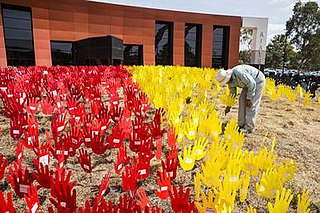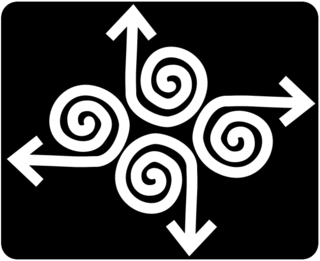Related Research Articles

The Aboriginal and Torres Strait Islander Commission (ATSIC) (1990–2005) was the Australian Government body through which Aboriginal Australians and Torres Strait Islanders were formally involved in the processes of government affecting their lives, established under the Hawke government in 1990. A number of Indigenous programs and organisations fell under the overall umbrella of ATSIC.
The Community Broadcasting Association of Australia (CBAA) is the peak body and the national representative organisation for community radio and television stations in Australia. The CBAA provide leadership, advocacy and support for members to actively provide independent broadcasting services and to build and strengthen local communities. The organisation provides advice and support to community broadcasters regarding a variety of issues.

Lowitja Lois O'Donoghue Smart, is an Aboriginal Australian retired public administrator. In 1990-1996 she was the inaugural chairperson of the Aboriginal and Torres Strait Islander Commission (ATSIC). She is patron of the Lowitja Institute, a research institute for Aboriginal & Torres Strait Islander health and wellbeing.
Reconciliation Australia is a non-government, not-for-profit foundation established in January 2001 to promote a continuing national focus for reconciliation between Indigenous and non-Indigenous Australians. It was established by the Council for Aboriginal Reconciliation, which was established to create a framework for furthering a government policy of reconciliation in Australia.

The Australian Institute of Aboriginal and Torres Strait Islander Studies (AIATSIS), established as the Australian Institute of Aboriginal Studies (AIAS) in 1964, is an independent Australian Government statutory authority. It is a collecting, publishing and research institute and is considered to be Australia's premier resource for information about the cultures and societies of Aboriginal and Torres Strait Islander peoples. The institute is a leader in ethical research and the handling of culturally sensitive material and holds in its collections many unique and irreplaceable items of cultural, historical and spiritual significance. The collection at AIATSIS has been built through over 50 years of research and engagement with Aboriginal and Torres Strait Islander communities and is now a source of language and culture revitalisation, native title research and family and community history. AIATSIS is located on Acton Peninsula in Canberra, Australian Capital Territory.
The Council of Australian Postgraduate Associations (CAPA) is the peak representative body for postgraduate students in Australia. CAPA's members are 33 postgraduate associations and the National Aboriginal & Torres Strait Islander Postgraduate Association (NATSIPA). CAPA provides member associations with representation to the Federal government, and peak bodies such as the Australian Research Council and Universities Australia, on issues affecting postgraduate students in Australia. In 2017, Australia had over 400,000 postgraduate students, representing one quarter of all tertiary students in Australia.
The Australia Council for the Arts, commonly known as the Australia Council, is the country's official arts council, serving as an arts funding and advisory body for the Government of Australia. The council was announced in 1967 as the Australian Council for the Arts, with the first members appointed the following year. It was made a statutory corporation by the passage of the Australia Council Act 1975.

The Australian National Aboriginal and Torres Strait Islander Education Policy (AEP) is a national policy adopted by the Government of Australia by each State and Territory government. The policy was first introduced in 1989 and is the foundation of education programs for all Indigenous Australians.
Indigenous Australian self-determination, also known as Aboriginal Australian self-determination, is the power relating to self-governance by Aboriginal and Torres Strait Islander peoples in Australia. It is the right of Aboriginal and Torres Strait Islander peoples to determine their own political status and pursue their own economic, social and cultural interests. Self-determination asserts that Aboriginal and Torres Strait Islander peoples should direct and implement Aboriginal and Torres Strait Islander policy formulation and provision of services. Self-determination encompasses both Aboriginal land rights and self-governance, and may also be supported by a treaty between a government and an Indigenous group in Australia.
Indigenous Australians are people with familial heritage from, and membership in, the ethnic groups that lived in areas within the Australian continent before British colonisation. They consist of two distinct groups: the Aboriginal peoples of the Australian mainland and Tasmania, and the Torres Strait Islander peoples from the seas between Queensland and Papua New Guinea. The term Aboriginal and Torres Strait Islander peoples or the person's specific cultural group, is often preferred, though the terms First Nations of Australia, First Peoples of Australia and First Australians are also increasingly common; 812,728 people self-identified as being of Aboriginal and/or Torres Strait Islander origin in the 2021 Australian Census, representing 3.2% of the total population of Australia. Of these Indigenous Australians, 91.4% identified as Aboriginal; 4.2% identified as Torres Strait Islander; while 4.4% identified with both groups. Since 1995, the Australian Aboriginal flag and the Torres Strait Islander flag have been official flags of Australia.
The Australian Indigenous Communications Association (AICA) is the peak body for Australia's Aboriginal and Torres Strait Islander broadcasters. It is the successor to the National Indigenous Media Association of Australia (NIMAA).
A community legal centre (CLC) is the Australian term for an independent not-for-profit organisation providing legal aid services, that is, provision of assistance to people who are unable to afford legal representation and access to the court system. They provide legal advice and traditional casework for free, primarily funded by federal, state and local government. Working with clients who are mostly the most disadvantaged and vulnerable people in Australian society, they also work with other agencies to address related problems, including financial, social and health issues. Their functions may include campaigning for law reform and developing community education programs.
Land councils, also known as Aboriginal land councils, or land and sea councils, are Australian community organisations, generally organised by region, that are commonly formed to represent the Indigenous Australians who occupied their particular region before the arrival of European settlers. They have historically advocated for recognition of traditional land rights, and also for the rights of Indigenous people in other areas such as equal wages and adequate housing. Land councils are self-supporting, and not funded by state or federal taxes.

The National Congress of Australia's First Peoples was the national representative body for Aboriginal and Torres Strait Islander Australians from 2009 to 2019.
Indigenous land rights in Australia, also known as Aboriginal land rights in Australia, are the rights and interests in land of Aboriginal and Torres Strait Islander people in Australia; the term may also include the struggle for those rights. Connection to the land and waters is vital in Australian Aboriginal culture and to that of Torres Strait Islander people, and there has been a long battle to gain legal and moral recognition of ownership of the lands and waters occupied by the many peoples prior to colonisation of Australia starting in 1788, and the annexation of the Torres Strait Islands by the colony of Queensland in the 1870s.
The Indigenous Land and Sea Corporation (ILSC) is an Australian federal government statutory authority with national responsibilities to assist Aboriginal and Torres Strait Islander people to acquire land and to manage assets to achieve cultural, social, environmental and economic benefits for Indigenous peoples and future generations. It was established as the Indigenous Land Corporation (ILC) following the enactment of the Native Title Act 1993.
The Closing the Gap framework is an Australian government strategy that aims to reduce disparity between Aboriginal and Torres Strait Islander peoples and non-Indigenous Australians on key health, education and economic opportunity targets. The strategy was launched in 2008 in response to the Close the Gap social justice movement, and revised in 2020 with additional targets and a refreshed strategy.

The Federal Council for the Advancement of Aborigines and Torres Strait Islanders (FCAATSI), founded in Adelaide, South Australia, as the Federal Council for Aboriginal Advancement (FCAA) on 16 February 1958, was a civil rights organisation which campaigned for the welfare of Aboriginal Australians and Torres Strait Islanders, and the first national body representing Aboriginal interests. It was influential in lobbying in favour of the 1967 Referendum on Aboriginal Australians. It was renamed to National Aboriginal and Islander Liberation Movement (NAILM) in the early to mid 1970s, before disbanding in 1978.
The Aboriginal and Torres Strait Islander Voice, also known as the Indigenous Voice to Parliament, the First Nations Voice or simply the Voice, is a proposed Australian federal advisory body to comprise Aboriginal and Torres Strait Islander people, to represent the views of Indigenous communities.
Australians for Native Title and Reconciliation (ANTaR) is an independent, national non-government, not-for-profit, community-based organisation founded in 1997 which advocates for the rights of Aboriginal and Torres Strait Islander people in Australia and aims to help overcome disadvantage. Its staff, board and membership comprise mainly non-Indigenous people who support Indigenous voices and interests.
References
- ↑ "Supply Nation". Australian Government Department of Employment. Department of Employment. 2014. Retrieved 23 July 2014.
- ↑ Natasha Mitchell (2014). "Indigenous Enterprises". ABC Life Matters. Australian Broadcasting Corporation. Retrieved 23 July 2014.
- ↑ Indigenous Business Australia (2014). "IBA Supply Nation". Australian Government, Indigenous Business Australia. Indigenous Business Australia. Retrieved 23 July 2014.
{{cite web}}:|author1=has generic name (help) - ↑ The Australian Government Department of Education, Employment and Workplace Relations (DEEWR). "Annual Report 2012-2013" (PDF). Supply Nation. Retrieved 23 July 2014.
- ↑ Karvelas, Patricia (14 May 2013). "Push for Preferential Treatment at G20 Summit". The Australian. Retrieved 23 July 2014.
- ↑ "Supply Nation CMS". Association Membership Software. AMS. Retrieved 23 July 2014.
- ↑ "Supply Nation Members". Supply Nation. Retrieved 3 September 2014.
- ↑ "Indigenous business". business.gov.au. 9 May 2019.